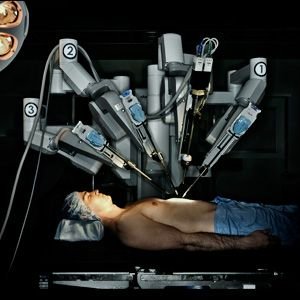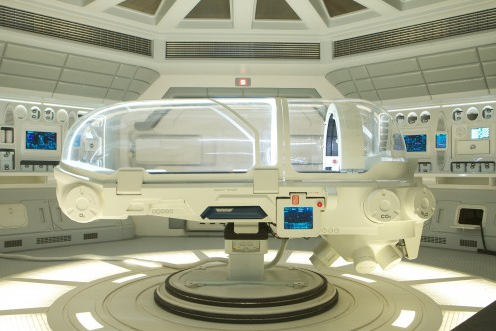Artificial Intelligence Will Make The Healthcare Debate Obsolete
Obamacare, state lines, premiums, monopolies - I'm sorry but technology will make this debate irrelevant.

[Image from Popular Mechanics, "The Robotic Doctor Is In" http://www.popularmechanics.com/science/health/a8798/the-robotic-doctor-is-in-15204883/]
I know, I know, it's one of the most dividing debates in America right now.
But hear me out, OK?
Artificial Intelligence is going to make debate about which kind of health care plan we should aim toward as a nation totally obsolete.
Because Artificial Intelligence IS the plan.
Or at least will be, way sooner than people expect.
Look at it this way.
When something is abundantly available, beneficient, and is easily accessible to people who seek it, what debate could there possibly be about obtaining it?
You just get it.
That's it.
Do you see people today hoarding light bulbs in their basements, so they can read in the dark while their neighbors toil in the night, hunched-over with a candle? And then gloat to their luminescently-challenged neighbors about how they'll have to pay an outrageous premium to rent one of their precious light bulbs for a desperate hour?
No.
People just buy light bulbs for a couple of bucks and go on with their day.
It's going to be the same with health care once A.I. gets deeper in the mix.
Computers can already classify skin cancers as successfully as doctors: https://www.theguardian.com/technology/2017/jan/25/ai-artificial-intelligence-recognise-skin-cancers
An AI health app outperformed doctors and nurses when it came to determining the cause of symptoms:
https://www.theguardian.com/technology/2016/oct/02/gp-smartphone-apps-threat-to-nhs
Computers are detecting genetic disorders to enable more personalized and effective treatment: https://www.wired.com/2017/01/computers-can-tell-glance-youve-got-genetic-disorders/
This doesn't even include the disruptive possibilities when A.I. is combined with potent technologies such as nanotech.
As A.I. develops, we'll certainly see its benefits in medicine made accessible to more and more people.
To think that only a few people would be able to afford them is totally off the mark.
Look at the history of the computer.
Decades ago some people scoffed that computers - colossal machines that filled entire rooms - could never be made any smaller. And worse, they argued, ordinary non-technically inclined people would never understand how to use them.
Yet the desktop personal computer cast that all aside. And with smart phones, we see how short-sighted the pessimists' worldview was.
And so shall we see that play out for A.I.
Imagine the mass rollout of technology that could remedy any medical issue.
I don't want to exaggerate.
But it'd be utopia.
We only have to look at examples from science-fiction to see the potential.
Consider the medical pod in the 2013 movie Elysium.
In less than a minute, a young girl's leukemia was completely cured in a seemingly effortless procedure:
[Clip from Elysium, directed by Neill Blomkamp, produced by Media Rights Capital, and distributed by TriStar]
The 2012 movie Prometheus also featured a medical pod that was completely automated which was able to remove an alien life form from a space crew member (of course, with some tense finagling, since the movie had to have a horror element):

[Image from Prometheus, 2012, directed by Ridley Scott, produced by Dune Entertainment and distributed by Fox]
You might wonder what will happen to human medical professionals when A.I. reaches the levels in those two movies. Will there be no more jobs for people?
On the contrary, there will be greater demand for the human touch in health care because people will finally be able to focus on service humans specialize in: care, listening, warmth, understanding, long-term mentorship and guidance. That, instead of following burdensome regulation and frantically seeking cost-reduction because of a lack of effective and affordable options.
And even if the technology isn't completely made available at the level we see smart phones today within a few decades, it's easy to imagine communities/towns pooling resources together to buy A.I. assisted devices like those medical pods to use as an institutional resource for residents.
Once people experience the benefits in person, the proliferation of medical A.I. will only accelerate as demand rises.
Sometimes to solve a problem you have to change the question being asked. Health care is one of those problems. The current questions and answers aren't getting us anywhere and pale in comparison to the implications of the following:
How do we improve medical A.I. even further and make it as ubiquitous as possible?
Solve that, and we solve health care.
Totally agree - the future of medicine lies in AI and CRISPR !
Congratulations @loverofliberty! You have received a personal award!
Click on the badge to view your own Board of Honor on SteemitBoard.
Congratulations @loverofliberty! You received a personal award!
Click here to view your Board
Congratulations @loverofliberty! You received a personal award!
You can view your badges on your Steem Board and compare to others on the Steem Ranking
Vote for @Steemitboard as a witness to get one more award and increased upvotes!